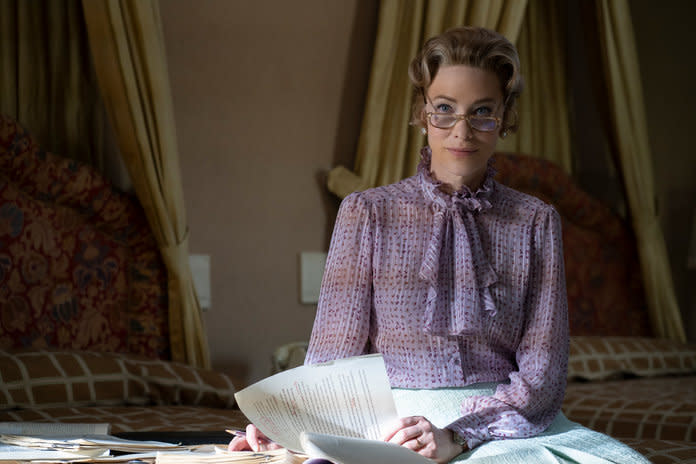Trust Me: Cate Blanchett in Mrs. America Is the Best Villain on TV
The first time you meet Cate Blanchett as conservative activist Phyllis Schlafly in Mrs. America, she’s parading down a runway at a 1971 fundraiser for a Republican congressman wearing nothing but an American flag bikini, a demure smile, and a very ladylike updo. As soon as she exits the stage, though, the sweet little smile fades and her gait shifts from bouncy pageant queen to monomaniacal woman on a mission.
Right away, I knew one thing: This is a person you do not want to piss off. If you got in her way, she’d probably knock you to the ground with her perfectly manicured hand and keep on walking. Like any great antagonist, though, I couldn’t wait to see who she’d try to knock down next.
FX’s Mrs. America tells the story of feminist icons like Gloria Steinem (Rose Byrne), Shirley Chisholm (Uzo Aduba), and Betty Friedan (Tracy Ullman) who fought to get the Equal Rights Amendment (ERA) ratified in the early 1970s. The actors are all mesmerizing (the jealousy and tension between Friedan and Steinem is especially fun to watch), but it’s Blanchett as the cardigan-wearing, anti-feminist villain Shlafly who gives the show its backbone. She’s a villain whose ambitions and dreams (like her failed attempt to run for Congress) have been squashed by sexism, so it’s tough to completely hate her. I actually related to her in a few scenes, which pissed me off (I mean, I never thought I’d identify with a woman who spent her life trying to sabotage the women who fought so hard for the right to choose in Roe v. Wade). That’s also why watching Blanchett’s performance is so much fun — just when she does something to make you scream, she turns around and does something else that makes you feel for her. Kind of like the Joker, she’s mesmerizing.

Each episode of Mrs. America starts with Phyllis, and watching her transform from a highly intelligent housewife with political aspirations into the fanatical leader of a grassroots army of bread-baking, conservative, white, upper middle-class housewives dead-set on keeping women in the Dark Ages is at turns shocking, entertaining, and infuriating. She’s like a one-woman Fox News, bulldozing her way into the minds of middle America by filling people (in this case, repressed housewives) with fear. These are women who hold protest signs saying “My Husband Gave Me Permission To Protest.” I actually re-watched that scene to make sure I read the sign right. Sadly, I had.
Phyllis tells women that if the ERA passes: Their daughters will be drafted! They’ll never be eligible for alimony! And the country will be overflowing with feminist lesbians who want everyone to have abortions all the time! Phyllis’ stance would be laughable if it weren’t still prevalent today. I mean, the last book she wrote before she died in 2016 was called The Conservative Case For Trump. The woman never changed.
Blanchett gives Phyllis a fierce intelligence that makes it impossible to truly despise her and write her off, which is the hallmark of any great screen villain. I once had a writing teacher who said that an antagonist can be 99% bad, but the remaining 1% needs to be heroic, or at least relatable. There’s a scene early on where a male politician and talk show host tells Phyllis to smile when the cameras roll. The look of anger on Blanchett’s face when the guy says this is subtle enough that the politician doesn’t notice, but any woman watching will probably deeply understand her and relate to her in that moment. I know I did.

In another scene, Phyllis goes to D.C. to meet with some (again, male) politicians. She goes as an equal — and actually you get the sense that she’s way smarter than any man in that room. They want the meeting to be off the record, so a Congressman tells his female secretary to leave. It’s just Phyllis and a bunch of dudes. Just as Phyllis starts making her points, the guys realize there is no one to take notes, so they ask Phyllis to go get a notepad and take notes.
That moment, again, was infuriating. Several years ago, I actually had a similar experience at work, where I was in a conference room with a bunch of guys, several of whom had the exact same title as me. But who did the male CEO ask to take notes? Me. I felt Blanchett’s quiet seething so hard in that moment of the show, I almost rooted for Phyllis Shlafly to succeed, or at least maybe to band together with Steinem and Chisholm and the feminists she despised. But you can’t rewrite history, and when it comes to women’s rights, Shlafly was no saint.
RELATED: Never Rarely Sometimes Always Will Make You Want to Call Your Best Friend
Blanchett even says at one point that if the Equal Rights Amendment passes, the world will become a “feminist totalitarian nightmare.” Blanchett delivers the line in a way that’s actually darkly comedic. It’s like a little wink to the audience, where the actor playing Phyllis is saying, “I know. This woman is totally ridiculous.” That’s the thing though — as ridiculous as Phyllis and her cardigan-wearing army of housewives may seem, they’re actually pretty scary. They make Mad Men’s Betty Draper look edgy, with their subservient attitudes and their insistence on keeping men in power. At least Betty had a little bit of a dark side. Blanchett’s Phyllis is more like a pastel-clad cult leader, rallying women against the people who are actually fighting for their rights. She’s a damn good cult leader, though, and I would not want to stand in her way.
Mrs. America left me wanting to fight even harder for women’s rights, especially after watching the ways that these women in the 1970s risked their families, their careers, and often their lives for the rights we have (and still struggle to maintain) today. It also gave me a new favorite villain in Blanchett’s Phyllis Schlafly — 99% of her terrified me, but there was that 1% that made me love her, just a little.

